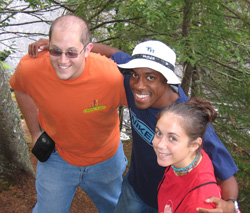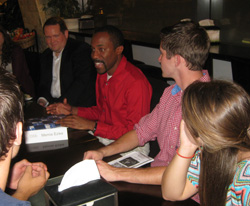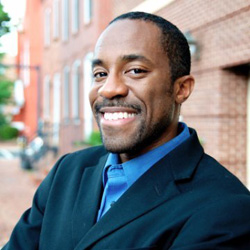Richard “Memie” Ezike ‘05 can trace his interests in environmentalism and the public good back to a specific moment in his childhood. One day when he was 7 years old, he watched as a tractor trailer rumbled through the apartment complex where he lived in Johnson City, Tenn., spewing black smoke from its exhaust tailpipe. Contemplating the negative effects this “dirty smoke” had on the air he and his neighbors were breathing, Ezike knew he wanted to do something to curb this problem.
A mathematics- and science-minded individual, Ezike exhibited a special aptitude for chemistry and credits his high school chemistry teacher, Nancy Bovender, with fueling his interest in the subject. After speaking with his father – a chemist – and exploring potential college majors on his own, Ezike decided that chemical engineering would afford him ample opportunities to conduct environmental research. Upon graduation from NC State he went on to complete both a master’s and Ph.D. in chemical engineering from the University of Michigan. As a research fellow there, he studied pollution prevention technologies, alternative fuels, and the reduction of nitrogen oxides in diesel-powered vehicles. But Ezike knew he didn’t want to spend the bulk of his career in a laboratory.
His desire to apply knowledge to practice led Ezike to the U.S. Patent and Trademark Office and then another patent firm in the Washington, D.C. area, where he examined patents related to oil and natural gas drilling and chemical engineering technologies. Like many young professionals, though, within a couple of years he realized his first post-academic positions were not the best fits for his strengths and interests.
“I had to learn some hard lessons about staying focused and working hard that, frankly, I did not pick up as well as I thought I did during college,” Ezike acknowledged. “The two times that I had to leave my patent jobs were watershed moments; I felt horrible, but those experiences forced me to search within myself, figure out where I had to improve as a person, and to look into other career avenues without fear or uncertainty.”

As Ezike began to reshape his career trajectory, his acquaintance-turned-mentor Leonard Robinson invited him to conduct research with EnviroBro, Robinson’s environmental consulting company. Through projects such as developing training on federal and state environmental laws for Chinese delegates, this role exposed Ezike to career opportunities at the intersection of the scientific and policy realms. Ezike, who spends a great deal of time serving the community through his involvement with the National Society of Black Engineers and the National Urban League, also broadened his professional network by cultivating connections he’d made through these organizations.
“I met a number of people who work in government and on Capitol Hill doing policy analysis,” he said. “A few were engineers, and when I asked them why they got into policy, they mentioned the desire to leave the traditional engineering space and use their skills and technical knowledge to advise policymakers on very important technical issues. Those reasons spoke directly to my heart, and I made the decision to pursue a role in the policy space.”
Last August, Ezike did just that. As a Transportation and Environmental Sustainability Fellow with the Congressional Black Caucus Foundation, he conducts social research on transportation trends and new technologies that impact the African American community experience. He regularly attends meetings – at the Brookings Institute and U.S. Department of Transportation (USDOT), for example – to learn about transportation accessibility issues, and is an avid reader of transportation and mobility-centered blogs such as Streetsblog, Greater Greater Washington, POLITICO Transportation, and The Atlantic’s CityLab. Based on his research, Ezike has developed preliminary recommendations to address equity concerns in the USDOT Beyond Traffic 2045 report.
Ezike enjoys his work because it aims to solve an issue that affects society on a daily basis, and positions him to make a significant impact on people’s ability to achieve economic improvement. In addition to his role with the Congressional Black Caucus Foundation, Ezike has returned to his academic roots by serving as an adjunct professor of chemistry at Northern Virginia Community College.

Ezike said his experience as a Park Scholar helped lay the groundwork for this interdisciplinary career path, as the program – and individuals like Park Faculty Mentor Lisa Bullard – opened him up to opportunities beyond engineering. As an alumnus, Ezike has offered perspective and advice on this topic to current Park Scholars. When the Class of 2017 traveled to Washington, D.C. to examine how leaders in the public and private sectors tackle challenges inherent in the STEM fields, Ezike was one of several Park alumni who participated in small-group discussions with the scholars about how he approaches these issues in his own work. Ezike has also given back by helping to identify future Park Scholars.
“As the Park program has grown in national prestige and continues to attract very high-performing candidates, I understood that I have a responsibility to ensure its continued success,” said Ezike, who has served on the Park Scholarships Selection Committee the past two years. “I wanted to have the opportunity to personally meet the excellent students that interview for the Park, learn about them, and select those who will carry on the exceptional Park legacy.”
posted 2016.06.20
